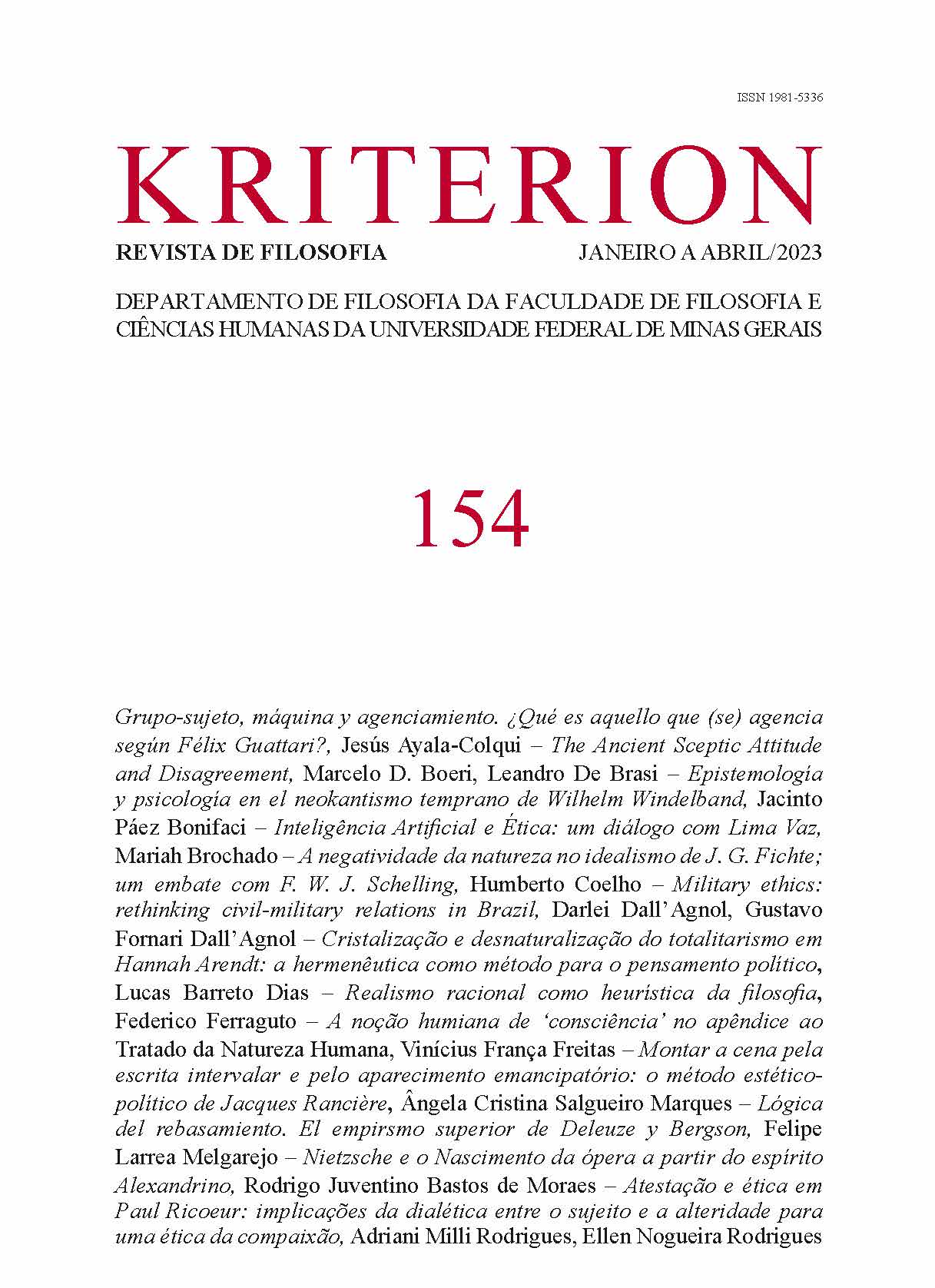INTELIGÊNCIA ARTIFICIAL E ÉTICA
UM DIÁLOGO COM LIMA VAZ
Palavras-chave:
inteligência artificial, civilização, ética, direitoResumo
Os feitos tecnológicos deste início de século levaram a humanidade a mitificar os processos maquínicos de alta performance funcional, a ponto de considerar programas computacionais como entidades inteligentes, as quais têm ampla aplicação em todos os setores da sociedade, como execução de atividades antes reservadas exclusivamente a humanos, na medida em que as realizam de forma infinitamente mais veloz, precisa e eficiente. A Ciência da Computação, associada à Robótica, tem obtido resultados estarrecedores
na projeção (design) incorporada de máquinas muito similares aos humanos (androides e ginoides), destinados a executar tarefas ainda mais ambiciosas, como a de se relacionar afetivamente com humanos. Entre esses feitos, o que chama especial atenção é a possível criação de máquinas moralmente mais elaboradas que os próprios humanos. Essa ambição toca diretamente os estatutos da Ética filosófica, desde a sua fundação socrática originária como ciência do ethos e, entre os filósofos que mais se dedicaram a refletir sobre os desafios e dilemas éticos do século XX, figura Henrique Cláudio de Lima Vaz, brasileiro de produção acadêmica e envergadura intelectual invulgares. Deixando um legado monumental à filosofia brasileira, Lima Vaz ocupou-se de diversificadas temáticas do nosso tempo, e suas reflexões seguem tão atuais quanto desafiadoras, atraindo intelectos, que se pretendam rigorosos, a revisitar sua vasta obra e buscar nela inspiração aquilatada para enfrentar questões urgentes dessa nova era que se anuncia. Uma dessas questões é a relação aqui apresentada entre os feitos da Inteligência Artificial e a referência vaziana ao processo mutacional ora vivido. Este artigo parte, portanto, da obra de Lima Vaz para apresentar alguns questionamentos éticos sobre as experiências inusitadas vividas hoje no horizonte de uma cultura altamente tecnicizada, as quais sujeitam o humano ao império de uma suposta superioridade maquínica,
o que acaba por impactar nosso universo simbólico, colocando sob suspeita alguns atributos intocáveis da essência espiritual que nos constitui, como a noção de consciência, abertura à transcendência irredutível aos feitos mais eloquentes de qualquer evolução técnica.
Referências
BITTAR, C. A. “Os Direitos da Personalidade”. São Paulo: Saraiva, 2015.
BODEN, M. A. “Inteligência Artificial: Uma Brevíssima Introdução”. Tradução de F. Santos. São Paulo: Editora Unesp, 2020.
BROCHADO, M. “Ética e Direito: pelas Trilhas de Padre Vaz”. Curitiba: CRV, 2021.
______. “Inteligência Artificial no Horizonte da Filosofia da Tecnologia: Técnica, Ética e Direito na Era Cybernética”. Tese apresentada à Faculdade de Direito da UFMG como requisito para a promoção à classe de Professor Titular de Filosofia da Tecnologia e do
Direito. Belo Horizonte, UFMG, 2022.
______. “Prolegômenos a uma Filosofia Algorítmica Futura que Possa Apresentar-se como Fundamento para um Cyberdireito”. Revista de Direito Público-RDP, Brasília, Vol. 18, Nr. 100, pp. 131-170, out./dez. 2021.
DELEUZE, G., GATTARI, F. “O Anti-édipo: Capitalismo e Esquizofrenia”. São Paulo: Editora 34, 2011.
DREYFUS, H. L. “Che Cosa non Possono Fare i Computer: i Limiti dell’Intelligenza Artificiale”. Roma: Armando Editore, 1988.
FEENBERG, A. “Questioning Technology”. London: Routledge, 1999.
LIMA VAZ, H. C. “Escritos de Filosofia II: Ética e Cultura”. São Paulo: Edições Loyola, 1993.
______. “Escritos de Filosofia IV: Introdução à Ética Filosófica 1”. São Paulo: Edições Loyola, 1999.
______. “Escritos de Filosofia V: Introdução à Ética Filosófica 2”. São Paulo: Edições Loyola, 2000.
MCCARTHY, J., HAYES, P. “Some Philosophical Problems from the Standpoint of Artificial Intelligence”. Stanford: Stanford University, 1969. Disponível em: http://www-formal.stanford.edu/jmc/mcchay69.pdf. Acessado 04 de fevereiro de 2022.
MORAIS, M. R. “Ética e Direito em Lima Vaz”. 2ª ed. Rio de Janeiro: Lumen Juris, 2018.
PEIXOTO, F. H. “Inteligência Artificial e Direito: Convergência Ética e Estratégica”. Curitiba: Alteridade Editora, 2020.
POLIDO, F. B. P. “Inteligência Artificial entre Estratégias Nacionais e Corrida Regulatória Global: Rotas Analíticas para uma Releitura Internacionalista e Comparada”. Revista da Faculdade de Direito da UFMG, Nr. 76, pp. 229-256, jan./jun. 2020.
RICH, E., KNIGHT, K. “Inteligência Artificial”. Tradução de M. C. S. R. Ratto. Revisão técnica de A. Antunes. São Paulo: Makron Books, 1993.
SALGADO, J. C. “A Ideia de Justiça no Mundo Contemporâneo: a Interpretação e Aplicação do Direito como Maximum Ético”. Belo Horizonte: Del Rey, 2006.
SALGADO, K. “A Filosofia da Dignidade Humana: a Contribuição do Alto Medievo”. Belo Horizonte: Mandamentos, 2009.
SILVEIRA, P. A. C. V. “Ética e Inteligência artificial: da Possibilidade Filosófica de Agentes Morais Artificiais”. Porto Alegre: Editora Fi, 2021.
SIMONDON, G. « Du Mode d’Existence des Objets Techniques ». Paris: Editions Aubier, 1989.
SMITH, B. C. “The Promise of Artificial Intelligence: Reckoning and Judgment”. Cambridge: MIT Press, 2019.
STANCIOLI, B. S., LOPES, G. F. P. “A Personificação de Agentes Autônomos de Inteligência Artificial”. Revista de Direito Civil Contemporâneo, Ano 7, Vol. 23, pp. 65-93. abr.-jun./2020.
WHITBY, B. “Inteligência Artificial: um Guia para Iniciantes”. Tradução de C. Blanc. São Paulo: Madras, 2004.
ZIVIANI, N. “A Quarta Revolução Tecnológica. Computação Cognitiva e a Humanização das Máquinas”. Disponível em https://homepages.dcc.ufmg.br/~nivio/papers/a-quartarevolucao-industrial-fonte-julho 2017.pdf. Acessado em 2 de fevereiro de 2022.
______. “Projeto de Algoritmos e Estruturas de Dados”. Campinas: Editora UNICAMP,1986.
Downloads
Publicado
Edição
Seção
Licença
Copyright (c) 2023 Revista Kriterion

Este trabalho está licenciado sob uma licença Creative Commons Attribution 4.0 International License.










